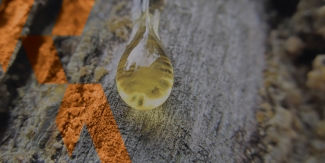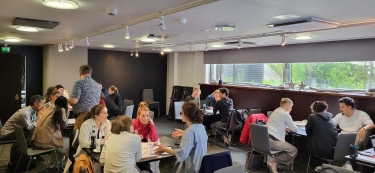Wild forest products can help propel green growth in Europe

30 September 2021, Joensuu and Rome
Wild forest products such as cork, natural resins, mushrooms, medicinal plants, nuts and berries have huge potential to contribute to green growth in Europe and to the achievement of the Sustainable Development Goals, according to a white paper issued today.
Co-published by the European Forest Institute (EFI) and the Food and Agriculture Organization of the United Nations (FAO), Non-wood forest products for people, nature and the green economy outlines the extent to which these forest products are embedded in daily life and the actions needed to leverage their potential more widely.
“Wild forest products are a huge source of nature-based solutions for food, medicine, cosmetics and industrial purposes,” said Senior FAO Forestry Officer Sven Walter. “They can significantly contribute to Europe’s policy priorities within the European Green Deal and help countries to transit towards a sustainable and circular bioeconomy.”
According to the white paper, the current and potential future economic value of wild forest products largely goes unnoticed in official statistics and foresight analysis.
However, the market value of non-wood forest products in Europe – though largely for self-consumption – has been estimated at €23 billion per year, similar to the total value of marketed roundwood, the paper explains. Around 90% of European households regularly consume wild forest products, while 26% collect some type at least once a year for self-consumption or sale.
Europe is also a central player in the international trade of wild forest products, importing €4.2 billion, or 50 percent of global imports, and exporting €3.4 billion, or 40 percent of global exports.
Risks and threats
While non-wood forest products make important contributions to healthy lives, lifestyles and livelihoods in the region, they face some risks, according to the report.
These include threats from climate and land-use changes, uncontrolled harvesting, inadequate management and illegal trade, along with tight market competition with fossil-based or non-renewable alternatives.
“Threats to wild forest products such as wild mushrooms and maritime pine could be mitigated by improving our systematic knowledge about these products, from harvesting and cultivation techniques to production, trade, distribution and consumption, as well as introducing adequate regulations, labeling and quality standards,” said lead author and EFI Mediterranean Office director, Inazio Martinez de Arano. “This would help unlock the potential of wild forest products to contribute to the European Green Deal, especially in relation to rural development, nature conservation, and human well-being.”
Political momentum needed
The white paper identifies key areas for action, which include securing the conservation and sustainable supply of wild forest products, building competitive and sustainable value chains, promoting a consistent approach to nature and landscape conservation, improving financial support and increasing attention to these forest products in vocational training.
“Edible, medicinal and other forest products used for commercial purposes will hold much greater future potential when a more sustainable, fair, and nature-based development path gains political momentum, social support and market drive,” said FAO non-wood forest product specialist Giulia Muir.
The findings and recommendations in the white paper stem from multi-stakeholder interactions and lessons learned from across the Mediterranean basin via the European Union-funded Horizon 2020 INCREDIBLE Thematic Network. The publication is the fifth edition of EFI's Knowledge to Action series.
Related links
- Non-wood forest products for people, nature and the green economy. Recommendations for policy priorities in Europe
- FAO Non-wood forest products publications
Recommended citation:
Martínez de Arano I, Maltoni S, Picardo A, Mutke, S et al. 2021. Non-wood forest products for people, nature and the green economy. Recommendations for policy priorities in Europe. A white paper based on lessons learned from around the Mediterranean. Knowledge to Action 5, European Forest Institute. DOI: https://doi.org/10.36333/k2a05


